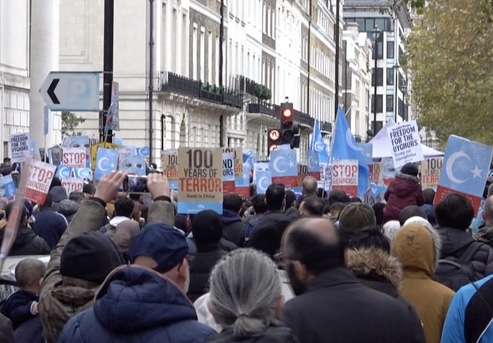A small but high profile and influential group of Conservative Party backbench MPs, including the Chair of the Foreign Affairs Select Committee, Alicia Kearns, and former Conservative Party leader, Sir Ian Duncan Smith, have publicly expressed their criticism of the ‘Economic activity of public bodies bill’ otherwise known as the Anti-Boycott Bill. They have joined dozens of civil society groups, Unions and human rights organisations who have been outspoken about the implications of the bill, which they say is actually primarily designed to stop the hugely successful ‘Boycott, Divestment, Sanctions (BDS)’ movement, which is a response to Israel’s illegal occupation of Palestinian territories.
The Bill specifically targets the BDS campaign
Whilst the bill defines its purpose as prohibiting the procurement and investment decisions made by public bodies that are “influenced by political or moral disapproval of foreign state conduct”, it has been made clear that it is very specifically targeting local Labour Party dominated councils such as Leicester and Lancaster and a number of universities which have imposed boycotts on Israeli goods originating from illegally occupied territories. The Conservative MPs and members of the House of Lords, a group which numbers at least 10, have challenged the bill’s citing of Israel (the only country specifically mentioned), saying that in its current form the bill will prevent public bodies taking action against a range of other countries guilty of human rights breaches.
Alicia Kearns MP: ‘I worry whether this will undermine community cohesion’
Alicia Kearns, Chair of the Foreign Affairs Select Committee said:
‘My concern is we should not specifically name Israel on the face of the bill. We should not do country-specific legislation as it undermines our foreign policy. I also worry whether this will undermine community cohesion.’
Sir Ian Duncan Smith says the bill may stop government bodies from responding to the persecution of Uighur Muslims
Former Conservative Party Leader, Sir Iain Duncan Smith expressed his concern that the bill may stop government bodies from responding to the persecution of Uighur Muslims in the Xinjaing province of China, by preventing them from refusing to buy Chinese-made goods. He said:
‘We have to make sure nothing gets in the way of stopping slave labour from Xinjiang being used in supply chains’
Palestinian Ambassador: The Bill ‘encourages more violations of international law, including the acquisition of territory by force’
The bill, which formed part of the government’s announcement in the last Queens speech, was finally introduced to the House of Commons this week and immediately provoked a harsh backlash from a number of sources including the Palestinian Ambassador to the UK, H.E. Husam Zomlot, who responded to the introduction of the bill by saying:
‘By providing a cloak of impunity, this bill encourages more violations of international law, including the acquisition of territory by force, the moving of civilian settler populations to occupied territory — a war crime – or land confiscations and home demolitions. We are deeply concerned that this has broader implications for Britain’s supposed commitment to the global rule-of-law-based order. We view the proposed legislation as yet another sign that the UK is abdicating its historic responsibility for and direct role in creating the plight of the Palestinian people.’
Representatives of the over 70 civil society organisations – NGOs, Human Rights Groups and activists who form a part of the coalition, which publicly supports BDS, issued a public statement stating their objections to the bill. It said:
‘We are concerned that this [bill] would prevent public bodies from deciding not to invest in or procure from companies complicit in the violation of the rights of the Palestinian people…We affirm that it is the right of public bodies to do so, and in fact a responsibility to break ties with companies contributing to abuses of rights and violations of international law in occupied Palestine and anywhere else where such acts occur.’
Michael Gove responded to the criticism by stating:
‘These [boycott, divestment and sanction] campaigns not only undermine the UK’s foreign policy but lead to appalling antisemitic rhetoric and abuse. My message to these organisations is to get on with your job and focus on delivering for the public.’
It was in December 2021, that Conservative MP Robert Jenrick, now Minister for Immigration, first announced that the UK government’ was “working to outlaw BDS in the UK” and his statement followed promises made in the Conservative manifesto leading up to the 2019 general election. Many commentators believe the latest move by the UK Government is part of a wider international push by the Israeli government and pro-Israeli supporters including law-fare practitioners to suppress solidarity with the Palestinian people.
















